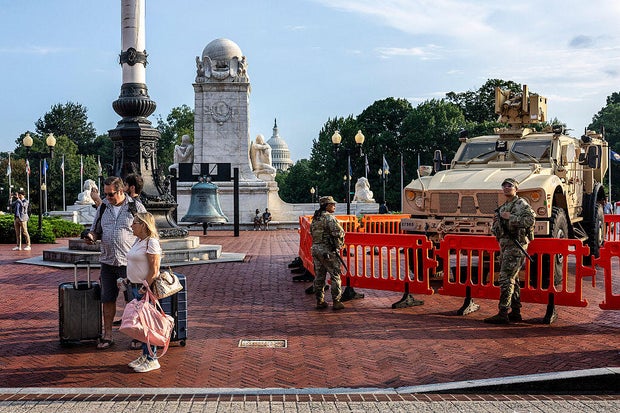Three states moved to deploy hundreds of members of their National Guard to the nation’s capital as part of the Trump administration’s effort to overhaul policing in Washington through a federal crackdown on crime and homelessness.
West Virginia said it was deploying 300 to 400 Guard troops, while South Carolina pledged 200 and Ohio says it will send 150 in the coming days.
The move comes as federal agents and National Guard troops have begun to appear across the heavily Democratic city after President Trump’s executive order on Monday, federalizing local police forces and activating about 800 D.C. National Guard troops.
Republican West Virginia Gov. Patrick Morrisey announced Saturday that he was sending a contingent of 300 to 400 Guard troops to Washington, while Republican South Carolina Gov. Henry McMaster authorized the deployment of 200 of his state’s National Guardsmen and Republican Ohio Gov. Mike DeWine said his state would send 150 military police at the request of the Defense Department.
JIM WATSON/AFP via Getty Images
“West Virginia is proud to stand with President Trump in his effort to restore pride and beauty to our nation’s capital,” Morrisey said.
Maj. Gen. James Seward, West Virginia’s adjutant general, said in a statement that members of the state’s National Guard “stand ready to support our partners in the National Capital Region” and that the troops’ “unique capabilities and preparedness make it an invaluable partner in this important undertaking.”
The activations suggest the Trump administration sees the need for additional manpower after the president personally played down the need for Washington to hire more police officers.
By adding outside troops to join the existing National Guard deployment and federal law enforcement officers temporarily assigned to Washington, Mr. Trump is exercising even tighter control over the city. It’s a power play that the president has justified as an emergency response to crime and homelessness, even though district officials have noted that violent crime is lower than it was during Trump’s first term in office.
A White House official told CBS News Saturday that National Guard members deployed to D.C. “may be armed,” but that they would not make arrests. This was a reversal from earlier in the week, when a Defense Department official told CBS News that deployed Guard members would not be armed at the request of local law enforcement partners. The official also said at the time they would not have weapons in their vehicles.
“The National Guard is not making arrests at this time – they may be armed, consistent with their mission and training, to protect federal assets, provide a safe environment for law enforcement officers to make arrests, and deter violent crime with a visible law enforcement presence,” the White House official said Saturday.
A protest against Mr. Trump’s intervention drew scores to Dupont Circle on Saturday afternoon before a march to the White House, about 1.5 miles away. Demonstrators assembled behind a banner that said “No fascist takeover of D.C.,” and some in the crowd held signs that said “No military occupation.” Mr. Trump was at his Virginia golf club after Friday’s summit with Russian President Vladimir Putin in Alaska.
Federal agents have appeared in some of the city’s most highly trafficked neighborhoods, garnering a mix of praise, pushback and alarm from local residents and leaders across the country.
City leaders, who are obliged to cooperate with the president’s order under the federal laws that direct the district’s local governance, have sought to work with the administration, though they have bristled at the scope of the president’s takeover.
On Friday, the administration reversed course on an order that aimed to place the head of the Drug Enforcement Administration as an “emergency police commissioner” after the district’s top lawyer sued to contest. After Friday’s court hearing, Attorney General Pam Bond issued a memo that directed the Metropolitan Police Department to cooperate with federal immigration enforcement regardless of any city law.
District officials say they are evaluating how to best comply.
In his order on Monday, Mr. Trump declared an emergency due to the “city government’s failure to maintain public order.” He said that impeded the “federal government’s ability to operate efficiently to address the nation’s broader interests without fear of our workers being subjected to rampant violence.”
In a letter to city residents, D.C. Mayor Muriel Bowser, a Democrat, wrote that “our limited self-government has never faced the type of test we are facing right now.” She added that if Washingtonians stick together, “we will show the entire nation what it looks like to fight for American democracy — even when we don’t have full access to it.”



